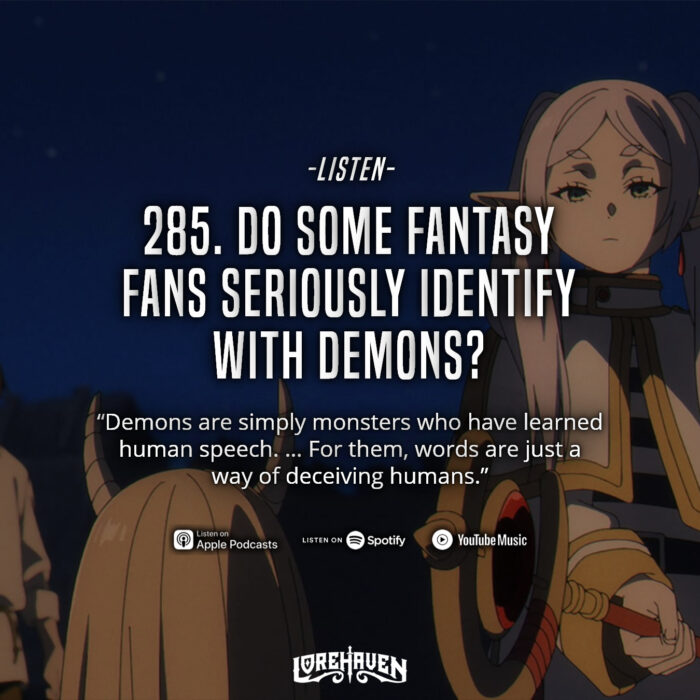285. Do Some Fantasy Fans Seriously Identify with Demons?
Podcast: Play in new window | Download (Duration: 1:02:32 — 58.6MB) | Embed
Many fans love the idea of demon hunters, whether they are Dr. Abraham Van Helsing’s warrior band, hyper-disciplined young shonen slayers, immortal elves, or K-pop stars. But in response to these righteous crusades, some fans find themselves defending the monsters. Are they really that bad? Shouldn’t we find ways to empathize with them? Today we explore the thorny problem of fans who won’t just defend but actually liken themselves to demons.
Episode sponsors
- Enclave Publishing: Glass Across the Sea by Sara Ella
- The Seekers series by J. A. Webb
- Cultural Engagement Giveaway: The Pop Culture Parent, On Magic and Miracles, and Above the Circle of Earth
Mission update
- Lorehaven reviews: Hideous Beauty, next: Glass Across the Sea
- Subscribe free to get updates and join the Lorehaven Guild
Concession stand (demon hunters edition)
- If you’re new, we approach this topic from a biblical worldview.
- “Demon” definitions get fuzzy when speaking in fantasy worlds.
- Eastern portrayals get closer to neutral “spirits” or even like fae.
- But that’s very different in Frieren’s East-looks-West fantasy tale.
- For more biblical explorations of demons, wait until next week’s ep.
Quotes and notes
- “Killing Demons is Awesome, Actually,” Master Samwise on YouTube, Oct. 17, 2025
- When Can Deconstructionism Threaten Christian Fiction? | with Michael Young aka ‘Wokal Distance’, Lorehaven podcast, March 14, 2023
1. In some tales, ‘demons’ are neutral/broken.
- For this, we must concede fictional redefinitions of “demons.”
- That goes double for stories with moral, yet not Christian, beliefs.
- Howl’s Moving Castle (book and film) describes a “fire demon.”
- But in other tales, demons are more like corrupted human beings.
- They only have a particular bent toward physical acting-out of evil.
- Demon Slayer is one franchise that presents demons this way.
- So does that smash hit of last summer, K-Pop Demon Hunters.
- Even the Count Dracula gets some sympathy at the very end.
- Basically they’re more like fantasy monsters, e.g. metahumans.
- These by design help us reflect on our own monstrous natures.
- But … that self-directed empathy must lead to desire for change.
- And in many hero stories, demons must change or else be slain.
2. And in Frieren, demons are evil deceivers.
- Setup for Frieren: Beyond Journey’s End manga/anime season 1.
- This world is directly inspired by DnD/RPG tropes, the classic kind.
- It’s a thoughtful/action sequel to the monomyth fantasy narrative.
- What happens after mortals die and the noble elf-mage lives on?
- Frieren trains a protege and recruits friends to take smaller quests.
- Along the way, they encounter a main series villain: demons.
- These demons look like humans but have supernatural powers.
- Moreover, they’re anti-empathetic. No tragic backstory. No hope.
- Unlike sinful humans or other villains, these can’t be redeemed.
- All that they claim, weep about, or do at all is meant to fool you.
- “Demons are simply monsters who have learned human speech.”
- “For them, words are just a way of deceiving humans.”
- This is much closer to the biblical picture of these fallen angels.
- It’s also a challenge to constant broken/tragic villains in fiction.
3. But some fans actually identify with evil.
- In response, some fans took umbrage to Frieren’s all-evil demons.
- Many welcomed this as a helpful corrective to overdone tropes.
- Others pushed back, looking for any “why couldn’t …?” loopholes.
- One dismissed this with materialistic excuses, “proving” too much!
- And some refused to acknowledge the existence of absolute evil.
- To them, any “demon” must be “empathized” with, and that’s all.
- Worst of all, some got in there and made this all about themselves.
- They saw themselves in the story not as heroes but as demons.
- Or they tried a hero-complex with a sociopolitical class evasion.
- They projected into the story “the marginalized” or “minorities.”
- A strange thought, this; most of us were just thinking of monsters.
- But folks often use a “political issue” as performative cosplay.
- The styling of one’s self as a “defender of oppressed” can make a fun distraction from realistic reflections of absolute evil.
- Christians see this as more than resistance to trope subversion.
- Such disputes reveal a terrible human affliction: hatred of truth.
- It’s an instinctive and sinful flinching at being called at all “evil.”
- Perhaps our Lord is using even “secular” stories to reflect His Law.
- No, we are not demons. But unless we repent we’ll share their fate.
- It would be just for God to destroy us. Thank Him for His mercy!
Com station
Top question for listeners
- Do you prefer fictional demons as broken or else totally evil?
Next on Fantastical Truth
Demons do bad things in the Bible and in the modern world. But how does a fallen spirit get around his limitations as an immaterial being? Meanwhile, how do creators of movies about demons get around the obvious budget limitations and need for showing not telling? Answer in both cases: demons “possess” people. Even in sci-fi the bad “entities” do this. But is this really the best word to use for how these Satanic agents can really influence, provoke, or oppress human beings?































Share your thoughts about this podcast episode